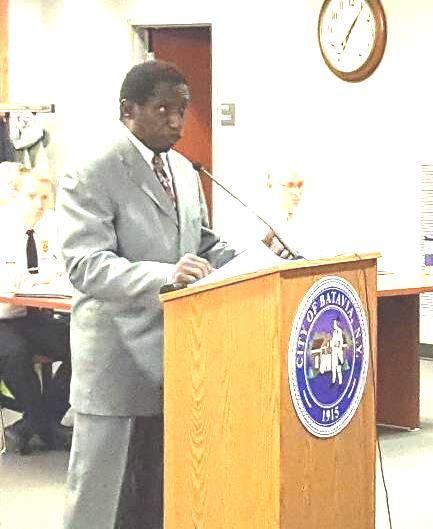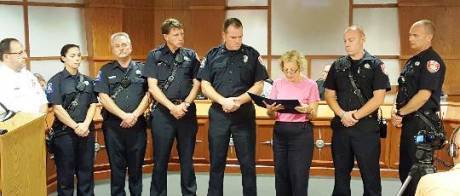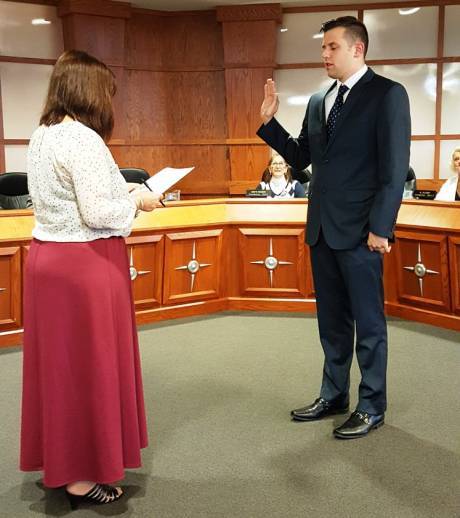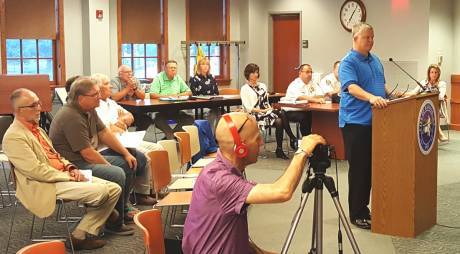An electric car charging station in Batavia’s downtown area may be a worthwhile venture, but it’s not in the best interests of the City of Batavia to oversee its operation and maintenance.
That’s the viewpoint of five of City Council’s nine members, who on Monday night voted against a proposal to partner with Genesee Region Clean Communities and the Genesee Transportation Council to put up an EV charging station in Batavia.
Council members Rose Mary Christian, Paul Viele, Robert Bialkowski, Al McGinnis and Kathleen Briggs voted against moving the measure to the board’s next Business Meeting for more discussion and a possible up-down vote, overriding “yes” votes by Council President Eugene Jankowski, Patti Pacino, Adam Tabelski and John Canale.
“It looks like a good idea, but it’s for a private enterprise,” McGinnis said. “I would think there are enough entrepreneurs that would knock each other down to get this. I don’t think we need to get involved.”
McGinnis asked how many electric cars were in Batavia, to which Tabelski replied (reading from a proposal packet) that there were 1,061 EVs that require charging in the Genesee Region as of 2015.
Tabelski voiced his approval of the EV charging station at the new Dunkin' Donuts at 405 W. Main St., adding that while a "private location downtown would be more feasible, I think it's (a city-run EV station) worth considering at least."
Jankowski said he could “see the benefit of it” but didn’t like the idea of government getting involved in running a business.
“We’ve seen what happens,” he said, apparently referring to the City’s ill-fated connection to the City Centre (formerly Genesee Country) Mall.
Canale put forth the argument that the charging station, which would have been placed in the northeastern corner of the Austin Park parking lot next to the Post Office, could be an attractive option for travelers on the Thruway and from the two big cities east and west of Batavia.
“It takes a considerable amount of time (to charge electric cars) and people won’t stay with their cars, they would go to a restaurant … spend some money,” he said. “An advantage to having it in the downtown area could attract people off the Thruway (to stop in Batavia).”
The proposal presented by City Manager Jason Molino was based a Genesee Regional EV Charging Station Plan indicating that the City of Batavia is a location where EV charging stations are needed.
He said the City would be obligated to a free, three-year ChargePoint network subscription. However, the City (as a host city) would not have to pay for the station – a $7,500 expense – but only the cost of installing a conduit from a utility pole to the charging station unit (estimated at $1,500).
As far as the cost of electric is concerned, Molino said the City could set and manage the pricing (if the City chose to charge for electric), could charge the consumer an hourly rate on a per kilowatt hour basis, with optional peak and off-peak rates, and could track consumption and related details of the station’s usage.
“After three years, the City could continue to subscribe to ChargePoint for an annual cost of $560 or drop the subscription and have the consumer continue to use the station via their app (on their mobile devices),” he said. “Also, the City (at that time) would have the option to remove the charging station.”
Afterward, Molino was asked whether he was disappointed by the proposal’s defeat.
“Well, we bring forward ideas and initiatives -- proposals to the Council because we think they promote certain elements and are progressive on certain matters,” he said. “The Council has the full right and authority to say that it’s consistent to what we think or not consistent of what we think, and we support those decisions both ways.”
“I totally understand their perspective on it, and right now we’re not going to move forward with that initiative. Should that change at a later date (however), I’m sure the Council would say, ‘Hey, we’re going to change it.’ ”
Asked if he thought that a private entity could step in, he said that it was possible, “just like what happened at Dunkin' Donuts.”
“It’s definitely a possibility that someone could do it on private property in the downtown area. Nothing’s prohibiting anybody from doing that.”
In the meeting’s public comments session, Jim Rosenbeck, of Lewis Avenue, also spoke against City involvement in an EV charging station, asking Council to “be cautious when this idea comes up.”
“It may sound good and feel good, but it costs the people money, and they’re not benefitting from this service,” he said.
Jankowski said he wished that the proposal went through to give the public an opportunity to weigh in on it.
“I just thought it would be nice to at least go to a vote and get two weeks for me to get some input,” he said.
“It’s not done, it just didn’t get put on the agenda, so if there’s public input on it and people want it, then it could be put back on a Conference meeting and re-voted at a future time. So, I’m going to wait until I receive any feedback and go from there.”
In other action, Council:
-- Moved to its Business Meeting a resolution approving the sale of five parcels that were auctioned to the highest bidders – 29 Brooklyn Ave., Louie Kingsbury, $4,000; 200 S. Swan St., Geib Corporation, $20,000; 1 Watson St., Justin and Yasmeen Calmes, $13,500; 46 Swan St., Justin and Yasmeen Calmes, $1,500; and 2 Willow St., Robert Fritschi, $19,000.
Christian expressed her dismay that the property at 46 Swan St. wasn’t sold to Ronald Viele, who had offered significantly more.
The City’s Municipal Code and Ethics Code, however, prohibit the purchase of real property to a City Council member or City employee, and it this case, Ronald Viele is the father of Council Member Paul Viele, who is involved in the family business. When Ronald Viele was informed of the restriction, he withdrew his offer.
-- Was advised of a letter sent to Bialkowski by Kathy Owen, of 2 Redfield Parkway, who is seeking the City’s help in restoring the pillars that act as a gateway to the street from West Main Street.
“The pillars are in a serious state of deterioration,” Bialkowski said, and urged Council to approve using some of the $52,000 earmarked for community development initiatives to fix them.
Molino said the City previously applied for grants for this project but was denied. He noted that two of the pillars are on private property and two are on city property, a situation that creates “some nuances” as far as repair work is concerned.
He said that the community development funds could be used as restoration of the pillars is considered a “neighborhood improvement” project. Cost to professionally repair the pillars was estimated at around $20,000.
-- Heard from Jonathan Bell, of Evans Street, who asked that the City put up a sign notifying drivers that there is an autistic child living on the street.
“I have five kids and one is severely autistic and runs in the street,” he said. “What’s a $100 sign when you are asking for $25,000 for rocks? My child’s life is worth more than a couple rocks (referring to the pillars on Redfield Parkway)."
Molino and Council members agreed to look into this, with Jankowski wondering aloud “what broke down in the process that this gentleman had to come to this meeting?" (instead of it being handled by city officials). Bell reportedly had called the City of Batavia office more than once but received no reply.
In photo at top, City Council Member Kathleen Briggs reads a proclamation designating Oct. 8-14 as Fire Prevention Week. She is joined by City firefighters, from left, Chief Stefano Napolitano, Christina Marinaccio, Tom Douglas, Jeff Stevens, Greg Ireland, Ryan Clair and Mike Morris. Photo by Mike Pettinella.




